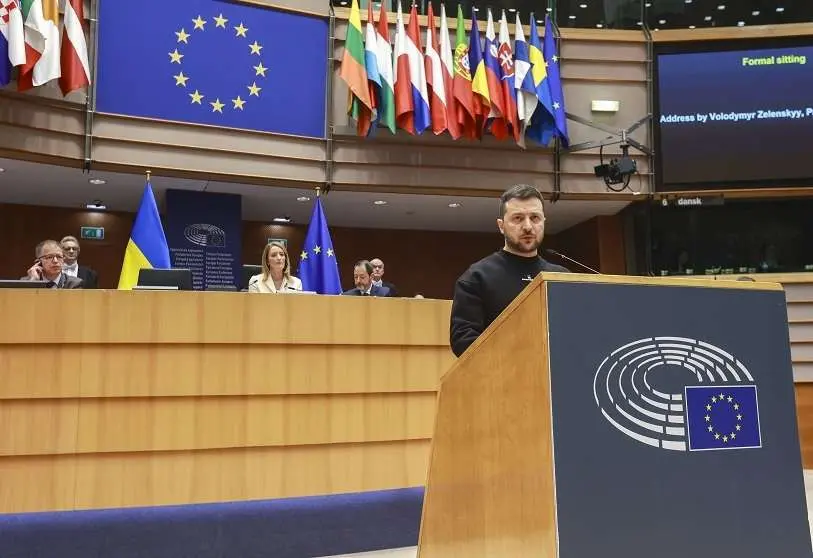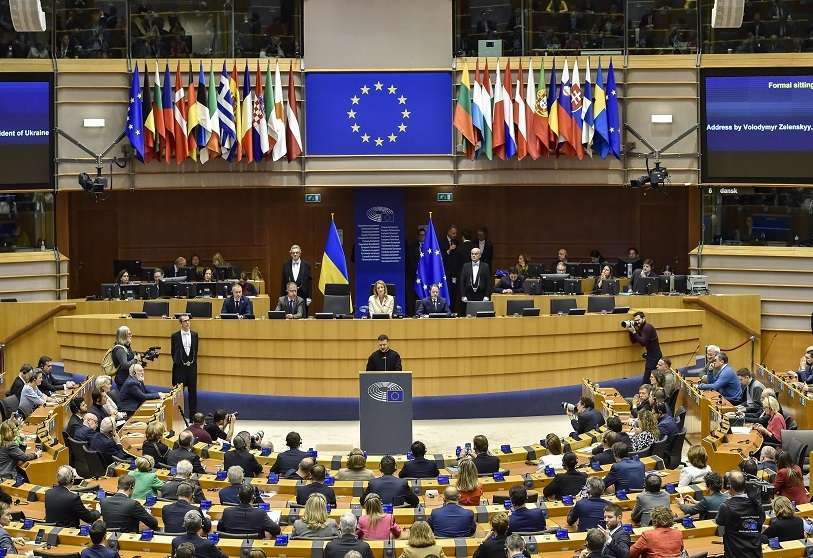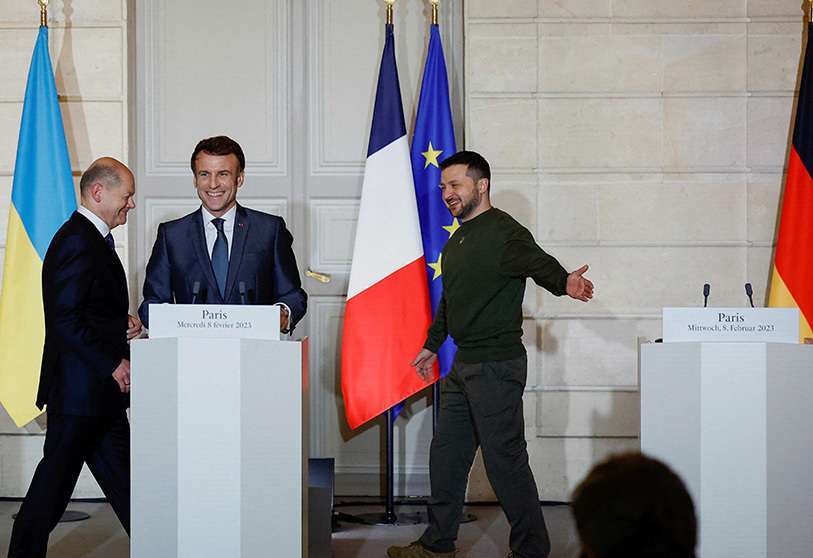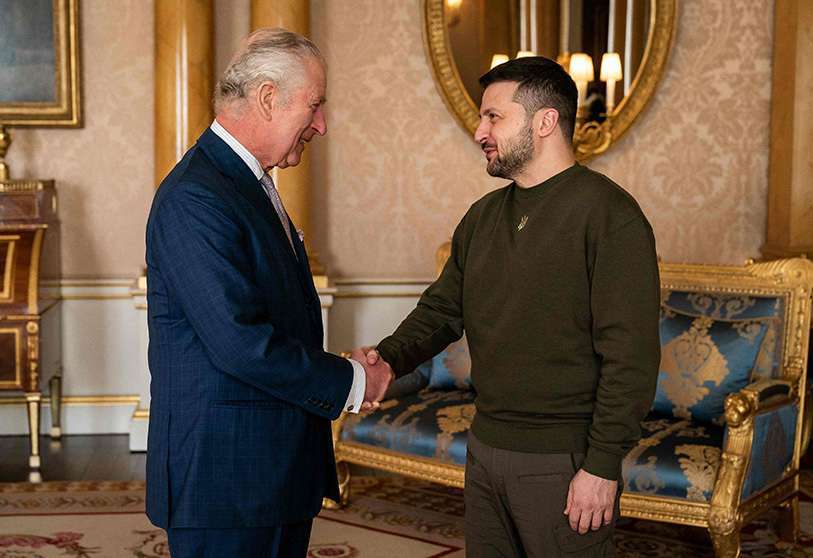Zelenski concludes European tour in Brussels: "Europe is defending itself"

A resounding ovation greeted the Ukrainian President when he took the floor in the European Parliament and another resounding ovation sent Zelenski off when he left the rostrum and climbed back into the VIP box with the President of the House, Roberta Metsola of Malta. For a few minutes, the Chamber on its feet reverberated the walls of the complex. Some MEPs could not resist the temptation to take out their mobile phones, tablets or whatever was needed to capture the scene, which will go down in the history of the Union. Although it was not the first time Zelenski had appeared in Parliament, it was the first time he had done so in person. And he was doing so at a critical moment for Ukraine, as the anniversary of the Russian invasion approaches and its troops advance their positions in the east of the country.
Zelenski, who had landed in Brussels on Thursday morning after visiting London and Paris on an express visit that served to show the support of his main allies in Western Europe for Kiev, made a plea from the rostrum in favour of the "European way of life", emphasising Ukraine's political will to form a full part of the European project for having fought against an actor that directly threatens the political model of the EU-27. "We are defending ourselves against the most anti-European force in the modern world", said Zelenski, who insisted that "Europe is defending itself".
The President of the European Commission, Ursula von der Leyen, the President of the European Council, Charles Michel, and the Belgian Prime Minister, Alexander de Croo, received Zelenski, who travelled in the company of the French President, Emmanuel Macron, with whom he had a meeting the night before at the Elysée Palace, also attended by the German Chancellor Olaf Scholz. The meeting was criticised by the Italian prime minister, Giorgia Meloni, who considered that it sent an "inappropriate" message. Despite the tensions, it was still a day marked in red on the European calendar, although few knew of the plans beforehand for security reasons.
With your voice, President @ZelenskyyUa, the voices of millions of Ukrainians echo through the halls of this assembly.
— Ursula von der Leyen (@vonderleyen) February 9, 2023
Millions of Ukrainians who are aspiring to a European future.
Let’s turn their dreams into reality. pic.twitter.com/zGj4nGTsYF
Zelenski was then driven from the European Parliament to the European Council, where he will address a special meeting of EU leaders. He will hold a series of bilateral meetings throughout the day to ensure, first and foremost, that the delivery of heavy weapons to Kiev goes ahead. The Ukrainian army is urgently demanding long-range artillery, the actual delivery of Leopard battle tanks, fighter aircraft and ammunition. "The next two months will be critical," a Ukrainian official told the Guardian newspaper in London. "My president is travelling to get results". Zelenski made it clear on Wednesday that the sooner they receive weapons, "the sooner this Russian aggression will end, and we can return to peace in Europe".
Speeding up Ukraine's EU accession process is the other major goal. "We are getting closer to the European Union, Ukraine will be a member of the European Union," Zelenski said from the rostrum of the European Parliament. The Ukrainian president will use his time in the EU capital to campaign for Kiev's integration in a record two years. But other European capitals are not so optimistic, saying that the process could take more than a decade. Moreover, Ukraine was granted candidate status less than a year ago, along with Moldova and Georgia, in that case favoured by the Russian invasion.
There is some scepticism among the EU, not least because of the threat of corruption. Ukraine had taken several steps to improve oversight and accountability and thus improve its position in corruption perception indices, which year after year placed it at the bottom of Europe. But the Russian invasion "has disrupted some of the reform processes and exacerbated the risks", reports Transparency International. Zelensky's recent purge of a dozen members of his administration, while sending a message of ruthlessness to European bodies, highlighted that this trend remains an endemic problem in the country.

"Ukraine is modernising and reforming its institutions," Zelenski told MEPs and Commissioners. "Even while fighting the invasion, in June 2022, the [Ukrainian] parliament adopted a National Anti-Corruption Strategy and appointed a new head of the office that brings corruption cases to court," adds Transparency International in its report.
Another of Zelenski's priorities is to consolidate EU support for his 10-point peace plan, which calls for the withdrawal of all Russian forces from Ukraine, the restoration of its territorial integrity and the creation of a special tribunal to try war crimes committed by the Russian army and senior commanders, among other issues. The document, which denounces that Russia "has shown no genuine will for a just and sustainable peace", will be broadly endorsed by the EU.
The EU partners are also drafting the content of a tenth round of sanctions against Russia, which could enter into force before 24 February, just one year after the invasion began, according to Euractiv. The media specialised in European information claims that Poland and the Baltic countries - Ukraine's main defenders within the EU-27 - will take advantage of Zelenski's visit to put pressure on the rest of the member states to implement the reconstruction plan for Ukraine.

The image is powerful. Macron and Scholz pose with Zelenski at the Elysée Palace. The Franco-German axis went ahead of the rest of the European Union and got the photo with the Ukrainian president a day before the rest. No one else was there. Neither Draghi, who had travelled by train to Kiev months earlier in the company of the French president and the German chancellor, nor his successor, nor any other European leader. Only Macron and Scholz. And not in Berlin, but in Paris. The message is twofold. On the one hand, the political capital of the European Union is no longer Berlin; on the other, the Franco-German axis is greased and continues to function despite the wear and tear.
The EU's main actors are aligned, and there is political will to assist Ukraine. Zelenski acknowledged as much in an interview with the French daily Le Figaro. "I think he has changed. And this time he has really changed. After all, he opened the door to tank deliveries. He also supported Ukraine's candidacy for EU membership. I think that was a real signal. We had many talks with France, Germany and other countries. I think today the trust is real," the Ukrainian president said of Macron. The Frenchman, who has stepped into the vacuum to assume continental leadership, appears to have stepped forward on Ukraine after having been ambiguous on the issue.

The German tripartite government, meanwhile, seems to have yielded to pressure from its Foreign Minister, Annalena Baerbock, amid tensions between the Social Democrats and Greens over their differing approaches to the conflict in Ukraine. In recent weeks, Scholz has strengthened his commitment to Kiev, as his new Defence Minister, Boris Pistorius, has shown. Pistorius himself set April as the date for the delivery of the first consignment of Leopard battle tanks to the Ukrainian army. The British-made Challenger 2s promised by Rishi Sunak's government will arrive first.
Hours earlier, Zelenski had toured 10 Downing Street with the Conservative Prime Minister, successor to his close friend Boris Johnson and the short-lived Liz Truss. This was his second trip abroad since the Russian invasion, after visiting Washington at the end of December. The Ukrainian president then appeared on Capitol Hill, followed by a visit to the Palace of Westminster, two iconic sites of his two main allies. Zelenski also walked the corridors of Buckingham Palace for an audience with King Charles III and was probably the first to do so in a tracksuit.








